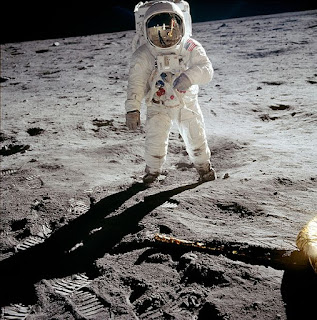It has been just over a day since space shuttle Atlantis touched down for the final time, thus ending its 33-flight career and NASA's space shuttle program as a whole. So, as NASA prepares to strip down its final shuttle in preparation for turning it into a museum exhibit while beginning the process of handing out the pink slips, what does America's future in space hold?
The simple answer: a trip to an asteroid by 2025 and to Mars by 2030. The complex answer: no one really knows for sure.
Back in 2004, President Bush introduced the Constellation Program, which was designed to return Americans to the Moon with the ultimate goal of establishing permanent bases on the Moon, which could later serve as launching platforms into deep space. With this new vision in mind, NASA set to work, spending billions and billions of dollars in developing the technology that would not only take Americans back to the Moon, but help them stay there for the long-term.
Unfortunately, unlike in the past, new presidents today often mean complete overhauls of policy, space exploration being no exception.
Within a year of coming into office, President Obama decided to kill Constellation, focusing on a more ambitious goal of sending astronauts to Asteroid and then to Mars. Result: all of the money, time, and effort spent on Constellation might as well have been wasted. However, this sudden cancellation did not sit well with some politicians, who managed to resurrect some parts of Constellation, namely the heavy-lift rocket, which is now set to be utilized for the Obama space plan.
The reason for going to the Moon was more about Earth politics than anything else.
However, come 2012 or 2016 after Obama leaves office, who's to say that the entire focus for America's future in space may not be shifted again?.Between 1961 when John F. Kennedy declared that Americans would go to the Moon and 1969 with the Apollo 11 landing, there were 3 presidents, yet one singular focus for NASA: going to the Moon. Now, though, without a Cold War rivalry and the public fascination with all things space (and not to mention today's serious financial problems), space exploration is often seen as a waste of money, never mind the fact that our survival as a species depends on traveling into space and colonizing the universe.
Apparently, some people just can't think in the long-term, which brings us to our current dilemma: not having any way to get Americans into space for the foreseeable future.
One day, the Sun will devour Earth, so, unless we want to go extinct, we must travel far into space to find a new home.
Yes, there are avenues to get into space, namely spacecraft built by private companies. Unfortunately, despite the vast knowledge to be found in these aerospace firms, the resources simply aren't there in order to get us back into space in the near future. Evidence: it has been nearly 7 years since the inaugural X-Prize for the creation of the first privately-owned space vehicle was claimed, yet commercial spaceflights are anything but routine. As of now, the best-case scenarios are for regular commercial spaceflights by 2016 at the earliest, which does not bode well for America's future in space.
As for NASA, its focus is on deep space exploration (the plan is for the private sector to take over the low-Earth orbit missions) and NASA is supposedly in the process of finalizing plans for a heavy-lift rocket, which should, if all goes as planned, be flying by 2016. However, as already addressed, budget woes are a huge concern when it comes to government-backed spaceflight. If anyone high up in the government is reading this, here's a suggestion: how about cutting off all monetary aid to America-hating nations and giving that money to NASA instead? Unfortunately, such a move is doubtful.
Bottom line: America has no clear picture of its future in space. Yes, there was another huge lapse in NASA's manned spaceflight program that lasted from 1975 (Apollo-Soyuz) to 1981 (Columbia's first flight, but there was a coherent plan in 1975 to build the space shuttle. Now? Well, if past events are any indication of the future, NASA's goals seem to get changed with every occupant of the White House. Obviously, if America is to become the dominant player in space one again, NASA needs a coherent, long-lasting vision, which should be going to Mars by 2030.
Humble requests:
If you found this informative (or at least entertaining), help me pay my bills and check out my Examiner pages for space news, cleveland photography, national photography, and astronomy for more great stuff.
If you think this was cool, why not tell a friend?
For something even better, follow this blog.


















No comments:
Post a Comment